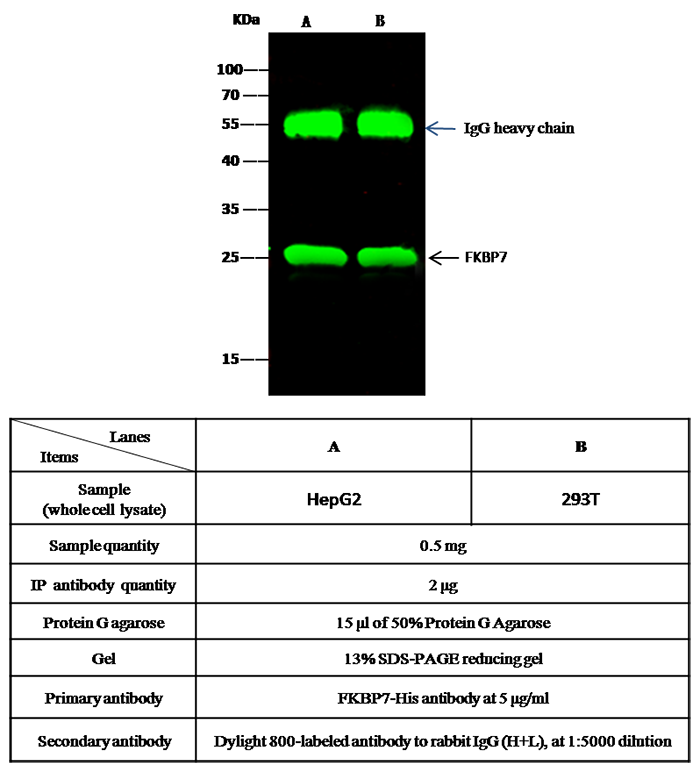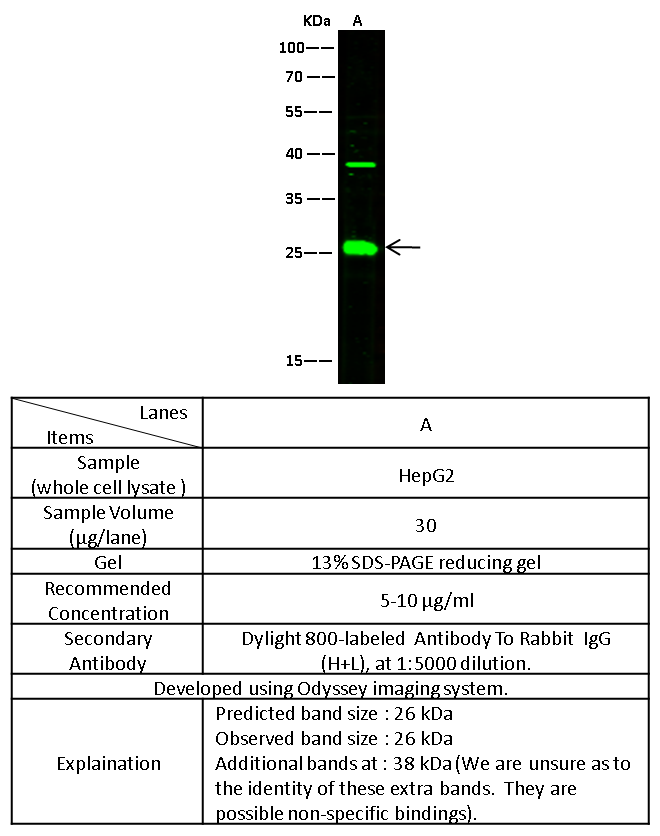-
Product Name
Anti-FKBP7 / Rotamase antibody
- Documents
-
Description
Rabbit polyclonal to FKBP7 / Rotamase
-
Tested applications
ELISA, WB, IP
-
Species reactivity
Human FKBP7 / Rotamase
-
Alternative names
FKBP23 antibody; FKBP-23 antibody; FKBP-23 antibody; FKBP-7 antibody; FKBP-7 antibody; MGC9420 antibody; peptidyl-prolyl cis-trans isomerase FKBP7 antibody; peptidyl-prolyl cis-trans isomerase FKBP7 antibody; PPIase FKBP7 antibody; PPIase FKBP7 antibody; rotamase antibody; rotamase antibody; RP23-468L22.3 antibody; UNQ670/PRO1304 antibody; PPIase antibody; PPIASE antibody; 23kDa antibody; FKBP-7 antibody; FKBP23 antibody; FKBP23 antibody; 23 kDa FK506-binding protein antibody; 23 kDa FK506-binding protein antibody; 23 kDa FKBP antibody; 23 kDa FKBP antibody; 23kDa antibody; FK506-binding protein 23 antibody; FK506-binding protein 7 antibody; FK506-binding protein 7 antibody; FKBP23 antibody
- Immunogen
-
Isotype
Rabbit IgG
-
Preparation
Produced in rabbits immunized with purified, recombinant Human FKBP7 / Rotamase (rh FKBP7 / Rotamase; Q9Y680-2; Met1-Gln218). FKBP7 / Rotamase specific IgG was purified by Human FKBP7 / Rotamase affinity chromatography.
-
Clonality
Polyclonal
-
Formulation
0.2 μm filtered solution in PBS
-
Storage instructions
This antibody can be stored at 2℃-8℃ for one month without detectable loss of activity. Antibody products are stable for twelve months from date of receipt when stored at -20℃ to -80℃. Preservative-Free.
Sodium azide is recommended to avoid contamination (final concentration 0.05%-0.1%). It is toxic to cells and should be disposed of properly. Avoid repeated freeze-thaw cycles. -
Applications
WB: 5-10 μg/mL
ELISA: 0.1-0.2 μg/mL
This antibody can be used at 0.1-0.2 μg/mL with the appropriate secondary reagents to detect Human FKBP7 / Rotamase. The detection limit for Human FKBP7 / Rotamase is < 0.039 ng/well.
IP: 1-4 μg/mg of lysate
-
Validations

FKBP7 / Rotamase Antibody, Rabbit PAb, Antigen Affinity Purified, Immunoprecipitation

FKBP7 / Rotamase Antibody, Rabbit PAb, Antigen Affinity Purified, Western blot
-
Background
PPIase is a member of the immunophilin protein family. It also belongs to the cyclophilin-type PPIase family, PPIL3 subfamily. PPIase contains 1 PPIase cyclophilin-type domain. Members of the immunophilin protein family play a role in immunoregulation and basic cellular processes involving protein folding and trafficking. PPIases accelerate the folding of proteins. It catalyzes the cis-trans isomerization of proline imidic peptide bonds in oligopeptides. It has a very high substrate specificity for the four-residue peptide Ala-Ala-Pro-Phe only when the proline peptide bond is in the trans state. It interacts with several intracellular signal transduction proteins including type I TGF-beta receptor. It also interacts with multiple intracellular calcium release channels, and coordinates multi-protein complex formation of the tetrameric skeletal muscle ryanodine receptor. In mouse, deletion of this homologous gene causes congenital heart disorder known as noncompaction of left ventricular myocardium.
-
References
- 1. Shor B, et al. (2008) A new pharmacologic action of CCI-779 involves FKBP12-independent inhibition of mTOR kinase activity and profound repression of global protein synthesis. Cancer Res. 68(8):2934-43.
- 2. Talmud PJ, et al. (2009) Gene-centric association signals for lipids and apolipoproteins identified via the HumanCVD BeadChip. Am J Hum Genet. 85(5):628-42.
- 3. Deleersnijder A, et al. (2011) Comparative analysis of different peptidyl-prolyl isomerases reveals FK506-binding protein 12 as the most potent enhancer of alpha-synuclein aggregation. J Biol Chem. 286(30):26687-701.
Related Products / Services
Please note: All products are "FOR RESEARCH USE ONLY AND ARE NOT INTENDED FOR DIAGNOSTIC OR THERAPEUTIC USE"
